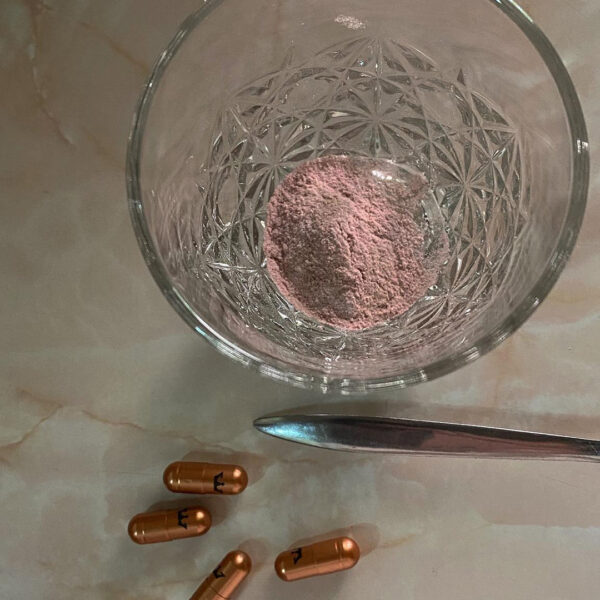Short on time? Poosh here for the summary.
Stress, stress, baby.
“Not all stress is bad,” says Ayurvedic Doctor Nidhi Pandya. “Small doses of periodic stress are useful for the body and mind and even build resilience, priming the body for change and challenge. Persistent or chronic stress is erosive and damaging.”
“Chronic stress is a state of constant pressure and arousal in the nervous system,” Nidhi says. “Humans are meant to balance periods of activity and intensity with periods of rest and repair. However, when there is prolonged intensity and the nervous system doesn’t get enough downtime, it can lead to an underlying sense of exhaustion or burnout, also known as chronic stress.” Fun times!
Nidhi says that chronic stress often stems from difficult life situations, including but not limited to: financial problems, unhealthy relationships, health issues, or a bad work environment.
“A constant seeking of productivity and chronically busy lives with poor time management can also lead to chronic stress,” she adds. “Unfortunately, a person may get used to living in this state of chronic stress, unaware of its full impact on the body, mind, and overall well-being, until something breaks.” Hello, burnout.
What does chronic stress do to us?
“Chronic stress can feel like dry heat in the nervous system that systematically erodes the soft myelin sheath, the protective insulation on our nerves,” Nidhi says.
“Over the long term, chronic stress can accelerate aging, lead to depression and anxiety, and even impact digestion, weight, hormones, immune function, blood pressure, and cardiovascular health,” she says. “Chronic stress can impact all areas of a person’s life, including the ability to make meaningful social connections. Finding the present moment and flow becomes extremely challenging.”
What are the most common signs of chronic stress?
“People with chronic stress often feel like they are living in survival mode and are unable to mentally disengage,” Nidhi says. “At a physical level, it can start out with dry eyes, overthinking, shallow breathing, and overeating.” She also adds that it’s not uncommon to rely on caffeine or alcohol to get through the day.
People with chronic stress may also feel “perpetual tiredness, a lack of enthusiasm, hypersensitivity, and possibly even hopelessness,” she says.
Difficulty sleeping is another common sign of chronic stress. “A constantly aroused nervous system interferes with the production of serotonin (the feel-good hormone) and thus, melatonin (its nighttime offspring), the hormone that promotes peaceful slumber,” Nidhi says. This interferes with our bodies’ ability to heal and repair during deep sleep.
How can we work on healing chronic stress?
Nidhi says that addressing chronic stress involves three things: prevention, coping, and repair.
Prevention Strategies
“These are daily practices that ground you and build resilience to maintain equilibrium when one gets on the battlefield,” she says.
- “Meditation is an effective strategy that activates the parasympathetic nervous system and facilitates witnessing rather than suffering,” Nidhi says.
- “Gratitude brings about a chemical shift in the brain, calms the nervous system, strengthens the immune system, promotes the abundance mindset, and thus improves the body’s response to a stressful situation,” she says.
- “Self-care practices also keep the system feeling safe,” she says. A few examples she recommends: regular exercise, classical music, warm, healthy meals, oil massages, and magnesium glycinate.
Coping Strategies
- Resonance breathing is Nidhi’s favorite coping strategy. “Resonance breathing comprises moderate to deep inhales and prolonged exhales, always through the nose. Inhales put our body in action mode, and exhales promote rest and relaxation.”
“Anytime we experience a threat, our breath shortens, setting itself into a quick inhale and super short exhale pattern. Lots of action and little to no repair. Thus, we may find ourselves reflexively sighing at the end of a long, stressful day,” Nadhi says. “Resonance breathing actively keeps the exhales longer, offering instant repair and making the body feel safe, thus lowering the impact of chronic stress.”
- Grounding yourself is another coping strategy that Nidhi recommends trying in the moment by “grounding the feet, slowing down body movements, and bringing a sense of mindfulness to the present moment.”
- Vagus, baby: As we’ve written about before, stimulating the vagus nerve can help you get out of fight-or-flight mode.
Active repair strategies
“These are essential when long-term chronic stress is present,” Nidhi says.
- Get help from a profesh because “cognitive behavioral therapy (CBT) and even hypnosis can be very useful in helping individuals change negative thought patterns and behaviors that contribute to stress,” Nidhi says. “Seeking professional help can be very beneficial in resolving trauma stored in the body as a result of chronic stress.”
- Build other interests and hobbies that can “help break the stress cycle,” Nidhi suggests.
- Remove yourself from the situation. “Sometimes, removing oneself may be the only resolution to chronic stress. This is especially true when one is stuck in a toxic relationship or a toxic work environment,” she says.
“A combination of preventative, coping, and repair strategies, as well as creating a life outside the stress circle,” Nidhi says, “can help one find their way back to well-being.”
Shop our calming collection:
Nidhi Pandya is an Ayurvedic Doctor and the creator of the Cosmic Alignment Method™, a revolutionary new program that blends ancient wisdom with modern science to unlock true wellness, elevate longevity, and confront and overcome key challenges in health, sleep, mood, and relationships.
The content provided in this article is provided for information purposes only and is not a substitute for professional advice and consultation, including professional medical advice and consultation; it is provided with the understanding that Poosh, LLC (“Poosh”) is not engaged in the provision or rendering of medical advice or services. The opinions and content included in the article are the views of the author only, and Poosh does not endorse or recommend any such content or information, or any product or service mentioned in the article. You understand and agree that Poosh shall not be liable for any claim, loss, or damage arising out of the use of, or reliance upon any content or information in the article.
Up next, be the first to know our weekly content and sign up for our Poosh newsletter.
TL;DR
Chronic stress is a state of constant pressure and arousal in the nervous system, which makes it feel like you’re always living in survival mode. Over the long term, chronic stress can accelerate aging, lead to depression and anxiety, and even impact digestion, weight, hormones, immune function, blood pressure, and cardiovascular health. A combo of strategies—preventative, coping, and repair—as well as creating a life outside the stress circle can help manage chronic stress.




































